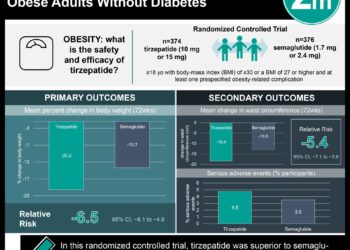Healthy dietary habits at midlife associated with better aging past 70
Image: PD
1. Healthy women in their 50s and 60s who reported consumption of diets that were high in vegetables, fruits, grains, and polyunsaturated fatty acids and low in sugar, red or processed meats, and salt, and with moderate alcohol intake, or overall more consistent with a Mediterranean diet subsequently reported lower prevalence of mortality and morbidity from diseases such as cancer, cardiovascular disease, diabetes, renal failure, COPD, Parkinson disease, multiple sclerosis, or ALS.
Evidence Rating Level: 3 (Average)
Study Rundown: As focus on preventative health has increased over recent years, many questions regarding diet’s complex role in health have arisen. This study looked at women in the Nurses’ Health Study to assess the association between healthier dieting in midlife (as assessed by standardized questionnaires) and healthy aging (as assessed by mortality, functional status, and morbidity from disease). The results show that women who scored in the top quintile on healthy dietary assessment scales were more likely to be rated as undergoing healthy aging than those scoring in the bottom quintile (ORs 1.34-1.46, p<0.002). Limitations of this study include its poor generalizability as only healthy female nurses participated. Furthermore, the ability of a self-reported questionnaire to capture all of the complexities of diet is limited.
Click to read the study in the Annals of Internal Medicine
Relevant Reading: Mediterranean’ dietary pattern for the primary prevention of cardiovascular disease
In-Depth [cross-sectional study]: This study looked at data from the Nurses’ Health Study in which 121700 female nurses were sent questionnaires every two years evaluating a number of variables. This included a semiquantatitive food frequency questionnaire (FFQ) as well as the Medical Outcomes Short-Form 36 Health Survey (SF-36) and an independent cognitive assessment. Data from FFQs reported in 1984 and 1986 were used to calculate the Alternative Healthy Eating Index-2010 (AHEI-2010) and Alternative Mediterranean diet (A-MeDi) scores. The AHEI-2010 assesses dietary consumption of vegetables, fruits, polyunsaturated fatty acids, sugar, red or processed meats, salt, and alcohol, while the A-MeDi assesses consumption of vegetables, fruits, nuts, wholegrains, legumes, fish, red or processed meats, alcohol, and monounsaturated fatty acid–saturated fatty acid ratios. The primary outcome measured in 2000 was ‘healthy aging’, as defined by being free of 11 chronic diseases (cancer, cardiovascular disease, diabetes, renal failure, COPD, Parkinson disease, multiple sclerosis, or ALS), with no impairment in cognition, no physical disabilities, and intact mental health. This information was obtained from the SF-36 as well as a telephone adaptation of the mini-mental status exam. Confounding variables such as BMI, smoking, and other risk factors were also tracked and included in multivariate analysis. Women were excluded from this study if they lacked any of the above data or if they already had a history of chronic disease.
Of the 10670 women included in this analysis, 11.0% were considered to be healthy agers. The main cause of ‘usual aging’ was a limitation in a cognitive, physical, or mental health domain (63.8%). When divided into quintiles based on AHEI-2010 or A-MeDi scores, women in the highest quintile were significantly more likely to have healthy aging than those in the lowest quintile (p value for trend <0.001 for AHEI-2010, 0.002 for A-MeDi). Individual elements of the FFQ that were most associated with better outcomes include more fruit (OR 1.46), moderate alcohol (OR 1.28), lower intakes of sugar beverages (OR 1.28), and lower intakes of polyunsaturated fatty acids (OR 1.38).
By Steven Zhao and Aimee Li MD
More from this author: Varenicline safe for smoking cessation in patients with stable major depressive disorder; Rates of high-risk prescribing significantly underreported by Medicare plans; MRA reveals higher prevalence of unruptured cerebral aneurysms than previously reported
© 2013 2minutemedicine.com. All rights reserved. No works may be reproduced without expressed written consent from 2minutemedicine.com. Disclaimer: We present factual information directly from peer reviewed medical journals. No post should be construed as medical advice and is not intended as such by the authors, editors, staff or by 2minutemedicine.com. PLEASE SEE A HEALTHCARE PROVIDER IN YOUR AREA IF YOU SEEK MEDICAL ADVICE OF ANY SORT.







